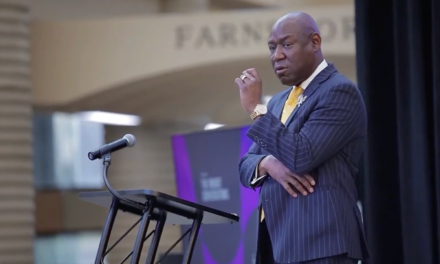She was known as a friend, a mentor, an artist and a Detroiter through and through, and now local artists are coming together to pay tribute to the legacy she left behind. The Scarab Club, in Detroit’s Midtown, recently unveiled its annual art exhibit and memorial to the late Detroit artist Gilda Snowden, open through April 15, 2022. The mixed-media exhibit, open to all artists, was reframed in 2015 to commemorate Snowden’s impact on Detroit’s arts community before she passed away in 2014.
In celebration of Women’s History Month, “American Black Journal” producer AJ Walker takes viewers to the Gilda Snowden Memorial Art Exhibit opening to see the works from local artists on display this year, as well as to hear first-hand anecdotes of Snowden’s community impact and cultural legacy from Gallery Director Treena Flannery-Erickson and this year’s featured artists.
Full Transcript:
AJ Walker, American Black Journal: Beauty and passion adorn the walls of the Scarab Club, for an event that is not just an art show, it’s a monument to a woman who gave so much to the art world and the community around her.
Treena Flannery-Erickson, Gallery Director, The Scarab Club: She had a tremendous love of her family and her community. She was, in her own right, an amazing artist and just a very prolific artist. She was a teacher, a mentor, colleague and friend to so many people, just countless people, and she always had just an enormous generosity of spirit.
AJ Walker: The legacy she leaves behind and what is now named the Gilda Snowden Memorial Exhibition, is giving artists a chance to show their work and take a moment to remember the woman who blazed the trail ahead of them. Before the opening of the exhibition, we stopped by the Scarab Club to meet some of the artists and speak with one of the people who knew Gilda on a personal level. Treena Flannery-Erickson, its Gallery Director. She said this was the perfect exhibition to name in Gilda’s honor.
Treena Flannery-Erickson: The Silver Medal exhibition, which this exhibition used to be called, was her favorite exhibition of the year, and she loved it so much because she felt that it was so inclusive. It was un-themed, all media, a juried exhibition, open to all artists, it could be anything,it could be absolutely anything. She loved the idea that students and their teachers might be hanging in the same space. She loved the idea that it was emerging artists and established artists, and that it was an opportunity for artists to have their work seen.
AJ Walker: Renowned quilt maker April Anue Shipp, made this quilt in Gilda’s image. It’s on display at the exhibition. She was inspired by Gilda, even though they had never met.
April Anue Shipp, Interdisciplinary Artist: When I started doing this piece, I was free. I let Gilda tell me what she wanted to have on this quilt. So I used fabrics and flowers and hand embroidery on it. There’s silk on there, there’s gauze on there, I just threw everything at it. I think I thought she would like that, because from what I heard about her was that she loved color, and so I wanted to honor her with just giving her my all, giving her all this beautiful color.
AJ Walker: One of the things Gilda was remembered for besides her beautiful art, was her passion for her community. That’s something April and Gilda have in common. Helping to serve your community through art and I know Gilda did that, and it sounds like you do that, too.
April Anue Shipp: Trying, trying. when Philando Castile was murdered by the police, my first instinct was to sew. And so, I cut up a bunch of squares and I would sit and sew by hand, and it gave me peace, right. I did a quilt entitled, “Say Their Names”, and it has the names of the African-American men, women and children who were murdered, unarmed, murdered by the police. And I would invite the community to come and pin the names of the victims on this piece.
AJ Walker: The Gilda Snowden Memorial Exhibition opened during Women’s History Month, a time when great women like Gilda are being recognized and appreciated in the art world and beyond. For April, when this exhibition is over and Women’s History Month comes to an end, she looks forward to her work continuing to be displayed in galleries like this one.
April Anue Shipp: This is a great time to be an artist right now. Most of our friends who are artists are in shows across the city, this is a great time. And they’re mostly women, painters and sculptors, and they run the gambit. So I think it’s a great time to be a black woman and to be a black woman artist. I’m having a ball. I’m enjoying my life. I’m having the time of my life, trust and believe.
AJ Walker: Treena says she’s glad that artists of all genders and races are now having their work recognized. She says art is a part of the conversation that is opening doors for equality, and it should be; artist Eno Laget agrees.
Eno Laget, Detroit Artist: It’s not so much about the object as a piece of art. It’s about the conversations that may happen, the opportunity to have the conversations about things that I think are really important, particularly now when we seem to be reliving a lot of the ugliness that occurred when I was a kid.
AJ Walker: He created this stencil of Rosa Parks, also on display at the exhibition. We’re standing here, we’re looking at your work that is paying homage to an African-American pioneer. And I just think it all lends to the advancement of women and women of color and just women around the world, even though I know we still have so far to go.
Eno Laget: Well it makes me so freakin happy, because what’s the history of this place? It’s, you know, more than a hundred years old. You guys wouldn’t’ve been in here at all, or if you were, as Treena said, you would have been carrying a tray. So, you know, women weren’t allowed in, people of color were not allowed in, and, you know, here we are in 2021 and we have a show that’s dedicated to a woman of color who had been very active in the community for many years, beloved by many people. And you know, it’s it’s a a little piece of a testimony to how things have changed. But at the same time, you know, it’s everywhere. There’s still so much work that needs to be done.
AJ Walker: The exhibition, named in honor of an African-American woman who paved the way for other artists, is a part of that work. Gilda Snowden, who hoped she was making a difference in the world.
Treena Flannery-Erickson: One of the things that she said to me is that we think we have forever, but we don’t. And so we have to identify what are the most important things in our lives and what we need to give our attention to. And that’s what we need to do.
Subscribe to Detroit Public Television’s YouTube Channel & Don’t miss American Black Journal on Tuesday at 7:30 p.m and Sunday at 9:30 a.m. on Detroit Public TV, WTVS-Channel 56.
Catch the daily conversations on our website, Facebook, Twitter and Instagram @amblackjournal.
View Past Episodes >
Watch American Black Journal on Tuesday at 7:30 p.m. and Sunday at 9:30 a.m. on Detroit Public TV, WTVS-Channel 56.




